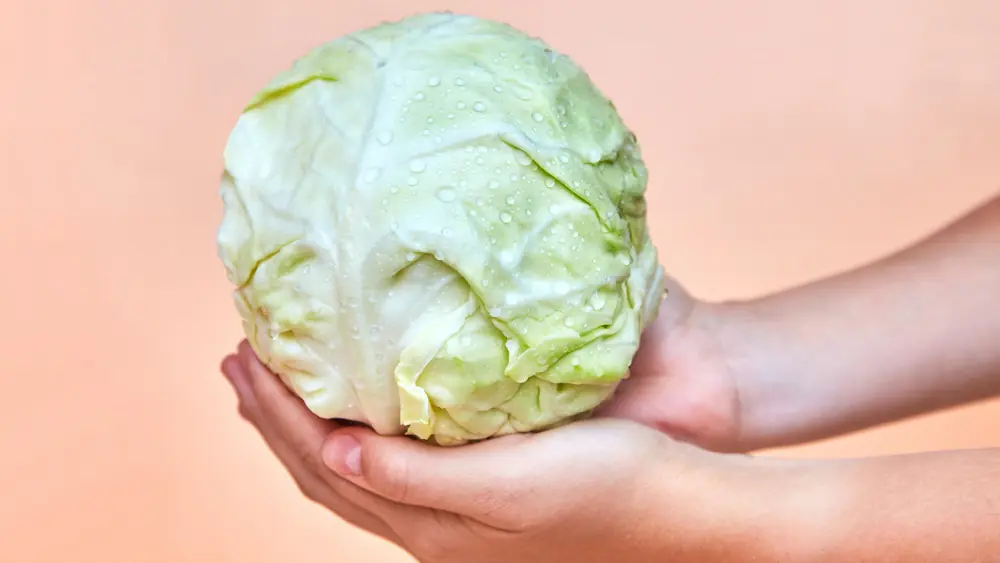
7 supermarket sale items employees advise against buying, no matter how cheap
7 Items Supermarket Staff Advise Against Buying, No Matter How Big the Discount, Due to Concerns Over Quality.

The Health Benefits and Risks of Eating Cabbage: Who Should Avoid It?
Cabbage is a popular vegetable known for its nutritional value and versatility in cooking. Part of the Brassica oleracea family, it is related to broccoli, cauliflower, kale, and Brussels sprouts. Cabbage contains various essential nutrients like vitamin K1, fiber, and antioxidants, and it has been associated with potential health benefits, such as improved digestion and reduced risk of certain diseases. However, there are some health risks and precautions that people should be aware of before consuming cabbage, particularly those with certain medical conditions.
Cabbage is rich in essential vitamins and minerals. It provides a good amount of vitamin C, fiber, potassium, and magnesium. It is also a great source of antioxidants, including flavonoids and polyphenols, which help protect the body against free radicals. These nutrients contribute to cabbage's potential benefits in preventing certain types of cancers, boosting immunity, and promoting heart health.
Moreover, cabbage is a low-calorie, high-fiber vegetable, which can aid in digestion, improve gut health, and regulate blood sugar levels. This makes it an ideal choice for individuals looking to maintain a balanced diet and manage weight.
1. Breastfeeding and Pain Relief: Cabbage leaves have been used as a natural remedy for relieving pain and swelling in breasts during breastfeeding. Applying cooled cabbage leaves to the affected area has been shown to reduce pain and discomfort effectively, offering relief comparable to chilled gel-packs.
2. Digestive Health: The fiber content in cabbage promotes healthy digestion, reduces bloating, and supports the growth of beneficial gut bacteria. It can also help in managing irritable bowel syndrome (IBS) and preventing constipation.
3. Anticancer Properties: Cabbage contains compounds like glucosinolates that are known for their potential anticancer effects, particularly in preventing colorectal cancer.
Despite its many health benefits, cabbage may not be suitable for everyone. In certain situations, eating cabbage can cause adverse effects. Below are some health conditions where cabbage consumption should be approached with caution:
1. Underactive Thyroid (Hypothyroidism): Cabbage and other cruciferous vegetables (broccoli, cauliflower, etc.) contain compounds called goitrogens that can interfere with thyroid function, particularly in individuals with hypothyroidism. These substances may reduce iodine uptake, which is necessary for the thyroid gland to produce hormones. People with hypothyroidism should consult a healthcare provider before including large amounts of cabbage in their diet.
2. Pregnancy: While cabbage is generally safe for consumption during pregnancy, there is insufficient information on the safety of consuming cabbage in medicinal amounts during pregnancy. It's advised to stick to food amounts unless guided by a healthcare provider.
3. Blood Clotting Disorders and Medications: Cabbage is high in vitamin K, which helps with blood clotting. If you're taking blood thinners like warfarin (Coumadin), cabbage can interfere with the medication’s effectiveness. If you’re on such medications, it's important to monitor your vitamin K intake carefully.
4. People with Gas or Bloating Sensitivity: While cabbage is healthy, it can cause gas and bloating in some people due to its fiber content and certain sugars that are hard to digest. If you have sensitive digestion or suffer from bloating, it’s best to consume cabbage in moderation.
Cabbage is usually safe when consumed in normal food amounts. However, overconsumption or long-term use as a medicinal treatment may lead to some side effects like digestive discomfort, including gas, bloating, and abdominal cramps. Applying cabbage leaves to the skin for prolonged periods can cause irritation, itching, and burning in some cases.
Cabbage can be enjoyed in various ways, from raw salads to cooked dishes like stews, soups, and stir-fries. The versatility of cabbage makes it easy to incorporate into meals throughout the day. You can also make cabbage juice or add it to smoothies for an extra nutritional boost.
Here are some ideas:
- Cabbage Salad: Toss chopped cabbage with other vegetables, such as carrots, cucumbers, and onions. Add a light dressing for a refreshing salad.
- Stir-fried Cabbage: Stir-fry cabbage with garlic and your favorite spices for a quick and healthy side dish.
- Cabbage Soup: Add cabbage to soups and stews for added fiber and nutrition.
- Cabbage Juice: Blend cabbage with other fruits and vegetables like apples and cucumbers for a nutrient-rich drink.
Cabbage is a nutritious vegetable that offers various health benefits, from supporting digestion to preventing cancer. However, individuals with certain conditions like hypothyroidism, blood clotting disorders, or digestive sensitivities should be cautious when consuming cabbage. Always consult with a healthcare provider if you're considering cabbage for medicinal use or if you have concerns regarding its effects on your health.
Adevarul.ro - Report on cabbage uses in health
National Institute of Diabetes and Digestive and Kidney Diseases (NIDDK)
WebMD - Health benefits of cabbage and precautions for certain medical conditions

7 Items Supermarket Staff Advise Against Buying, No Matter How Big the Discount, Due to Concerns Over Quality.

As consumers become increasingly cautious about the quality of cooking oils, many are turning to animal fats as a complete alternative. But is this truly a wise decision for health?

A woman from Guadeloupe has been identified as the only person in the world with a completely new blood type

It’s not the air conditioner, but the refrigerator that’s the real culprit behind your skyrocketing electricity bills. Improper placement of this appliance can also lead to increased energy consumption.

Heavy metal pollution has become an invisible threat to modern human health. Studies reveal that up to 87% of people have varying levels of heavy metals lingering in their bodies.


Esophageal cancer is becoming a significant health threat. This article will explore the key risk factors, high-risk groups, and underlying conditions that may lead to esophageal cancer, helping you gain a deeper understanding of this dangerous disease.

Not All Bananas Are Worth Buying: 4 Types You Should Avoid, Even at Discounted Prices

While many popular brands promise superior protection, the reality is that some products fail to meet the standards necessary to effectively safeguard your skin.

The recent case of lead poisoning from a metal water bottle serves as a stark reminder of the potential health risks associated with using old or damaged bottles.

The recent surge in hepatitis A infections across Europe and the UK serves as a reminder of the importance of proper food hygiene and vaccination, especially when traveling to regions with higher risks of the virus.

Discover the fascinating world of marine viruses and their vital role in ocean ecosystems. With up to 10 million virus particles in a single drop of seawater, learn how these tiny entities influence microbial populations, nutrient cycles, and the environm

While turkey neck can be a cosmetic concern, there are several non-invasive treatments and lifestyle changes that can help improve the appearance of sagging neck skin.

Discover the foods you should avoid for a healthy heart, including trans fats, excess sugar, and processed meats.

Struggling with leg cramps at night? Learn about common causes of night leg cramps and effective solutions to prevent and relieve them.

Discover the amazing health benefits of eating bananas every day. From improved digestion and heart health to boosting mood, find out how this simple fruit can transform your body. Learn more in our comprehensive guide.

Learn about ganglion cysts, including their causes, how daily activities like repetitive movements and poor posture can make them grow, and expert tips on prevention. Discover when to seek medical attention and ensure proper joint health.

Learn how magnesium supports bone health, blood sugar management, anxiety relief, and digestive health. Find out the best forms, dosages, and foods rich in magnesium to boost overall well-being and manage health conditions.


7 Items Supermarket Staff Advise Against Buying, No Matter How Big the Discount, Due to Concerns Over Quality.

As consumers become increasingly cautious about the quality of cooking oils, many are turning to animal fats as a complete alternative. But is this truly a wise decision for health?

A woman from Guadeloupe has been identified as the only person in the world with a completely new blood type

It’s not the air conditioner, but the refrigerator that’s the real culprit behind your skyrocketing electricity bills. Improper placement of this appliance can also lead to increased energy consumption.

Heavy metal pollution has become an invisible threat to modern human health. Studies reveal that up to 87% of people have varying levels of heavy metals lingering in their bodies.

By incorporating these natural methods into your daily routine, you can strengthen your teeth, support your gums, and prevent further decay.


Agatha Christie, the Queen of Crime Fiction, vanished for 11 days in 1926, leaving the world in suspense. Discover how personal heartbreak led to her greatest creative revival and the birth of her most iconic works.

Parents of tweens and teens, listen up! Discover the powerful 'Add 20% Rule' for effective communication. Learn why assuming your child knows more than you think about topics.

Esophageal cancer is becoming a significant health threat. This article will explore the key risk factors, high-risk groups, and underlying conditions that may lead to esophageal cancer, helping you gain a deeper understanding of this dangerous disease.

Yvette Kahn’s tragic story is a powerful reminder of innocence lost during the Holocaust. Despite the horrors she faced, Yvette found music in a world that tried to silence her. Remembering her is a call to preserve the beauty and resilience of childhoo

This DIY flaxseed-based skincare routine offers a natural, affordable, and effective way to combat wrinkles and promote a more youthful appearance.

Kandice Pritchard-Harmon's adoption as a preteen began a journey filled with identity struggles and cultural shifts. Discover how her quest for freedom led to a transformative enlistment in the U.S. Army, building resilience, global experiences, and a pow


Try these simple, effective remedies and enjoy the benefits of natural hair care. O

Carla’s curiosity led her to follow two lonely twin girls in the park, but what she uncovered about their tragic home life sh0cked her to the core.

Natural remedies, on the other hand, provide a safe, affordable, and effective way to promote thicker, longer, and healthier eyelashes over time.

After years of looking down on his ex-wife, Anton's world is turned upside down when he sees her in a luxurious mansion, living a life he never imagined. A gripping tale of pride, revenge, and the consequences of underestimating someone’s strength.

Packed with skin-loving nutrients like vitamin C, antioxidants, omega-3 fatty acids, and collagen-boosting compounds, this gel can transform your skin, providing deep hydration, elasticity, and a youthful glow.

Not All Bananas Are Worth Buying: 4 Types You Should Avoid, Even at Discounted Prices